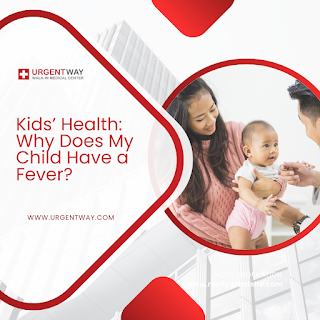Kids’ Health: Why Does My Child Have a Fever?
No matter their age or overall health, everyone can be afraid of fevers. However, when your child has a fever, it can be extremely frightening. When their sick infant has a fever, new parents are particularly prone to fear and frequently feel compelled to head straight to the emergency hospital for treatment. A study found that worries about a high-temperature account for up to one-third of pediatric ER visits. However, the great majority don't need medical attention right away. The main cause of panic, according to the same study, was parents' ignorance of what a fever actually signifies.
Fever
It's useful to know what a fever actually is before you can
make an informed decision about whether or not it's harmful. An elevation in
body temperature over the normal range is referred to as a fever, or pyrexia in
technical terms. Age, gender, degree of effort, emotions, and even the area of
the body utilized to monitor temperature can all affect what constitutes a
normal body temperature. It is believed that the usual range, which encompasses
these parameters, is between 97.5 and 99.5 °F (36.5 and 37.5 °C). Most medical
professionals define a fever as 100.4 °F when measured with a rectal
thermometer (100 °F taken orally or 99 °F taken under the armpit), while
anything above that range may be termed a fever.
When Should You
Worry?
As previously mentioned, a temperature that is higher than
normal can be classified as a fever, but medical professionals don't usually
get concerned about a child's health until it reaches 104 °F or higher. The
main explanation for this is that, in almost all cases, a temperature that is
lower than that is a natural, healthy reaction to whatever ailment the body is
experiencing. Stated differently, a temperature below 104 °F shouldn't raise
any red flags or necessitate an emergency department visit.
In fact, specific temperature measurements alone are often
not as effective as assessing additional symptoms. If your child has a fever
other than the following signs and symptoms, you should call 911 right away:
- Too weak to walk or stand
- Will not wake up
- Severe difficulty breathing and barely speaking or crying
- Red or purple spots/dots on the skin.
- Other indicators of a life-threatening emergency
There are other signs and symptoms related to a high fever
that can be a cause for concern. If your child is experiencing any of the
following, it is recommended you seek medical care like that provided by
UrgentWay Clinic, an urgent care facility dedicated to walk-in pediatric urgent care:
- fever
over 104 °F (or any fever in children younger than 12 weeks)
- trouble
breathing
- trouble
swallowing
- chills
and shaking
- dehydration
- weak
immune system (pre-existing condition)
- fever
lasts longer than 3 days
- fever
returning after no fever for 24 hours
- has
febrile seizures (they are usually not serious and pass within a few
minutes)




Comments
Post a Comment